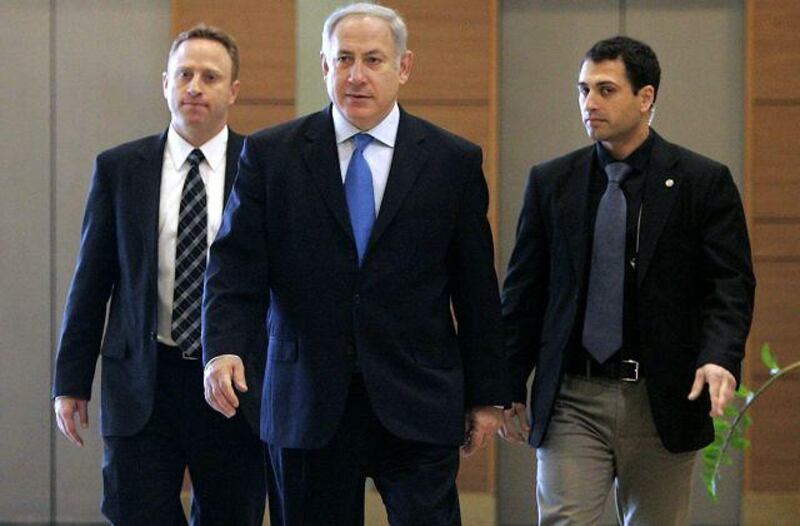TEL AVIV // Benjamin Netanyahu, designated as the next Israeli prime minister, yesterday was close to sealing critical agreements with two parties that would become his biggest partners in a narrow ruling coalition, even amid speculation that a broad government with the centrist Kadima movement is still possible. Mr Netanyahu, leader of Likud, a right-wing party, signed a pact with the ultranationalist Yisrael Beiteinu party and was expected to clinch another accord with the ultrareligious Shas party, paving the way to a coalition that would most likely include only hawkish Jewish parties. Most notably, the agreements call for Avigdor Lieberman, a controversial hardline legislator known for his outspoken views against Israel's Arab minority, to take the prominent role of foreign minister. However, the agreements left the door open to a unity government with Kadima, led by Tzipi Livni, the outgoing foreign minister who - unlike Mr Netanyahu - supports peace talks with the Palestinians on the creation of a Palestinian state. The pact with Yisrael Beiteinu is believed to contain a clause stipulating that it is valid only if Kadima refuses to join the coalition. Although Kadima won one seat more than Likud in February's national elections, it did not garner enough parliamentary support to itself cobble together a coalition and has said it would head the opposition. By adding Kadima to his coalition, Mr Netanyahu's government would have a better chance to survive in Israel's notoriously turbulent political arena because it would include an overwhelming majority of the 120-member parliament. Additionally, it is also more likely to gain international legitimacy than would a narrow right-wing coalition. Mr Netanyahu and Ms Livni held at least two low-profile meetings in the past week to discuss joining forces. Mr Netanyahu is believed to have softened his stance towards Ms Livni's insistence for a rotational premiership, not ruling out splitting the four-year term as prime minister with the Kadima leader. However, he would also have to give in to Ms Livni's demand that the government support conducting talks on a two-state solution for the Israeli-Palestinian conflict, an unlikely prospect given the opposition of most of his hawkish coalition partners to the idea. Mr Netanyahu himself backs a bottom-up approach that would strengthen the Palestinian economy and security institutions in the West Bank to prepare the ground for a future peace process. Despite renewed negotiations between Likud and Kadima, the chances for an alliance appear slim. In a discussion with fellow Kadima legislators yesterday, Ms Livni said her demands have not changed and repeated that she refuses to become a "fig leaf" for a coalition of the Right. Furthermore, Mr Netanyahu is running out of time to form a coalition with Kadima. The hawkish former prime minister is hoping to present his new government to parliament this week or by Monday, at the latest, to avoid asking Israel's president, Shimon Peres, for a two-week extension. In the next few days, Mr Netanyahu still needs to clinch pacts with at least two more small parties to put the finishing touches to a governing coalition. Mr Netanyahu's bid to build a coalition is being conducted amid intensified efforts by the outgoing prime minister, Ehud Olmert, to conclude one of the most domestically burning issues of his term, the abduction of an Israeli soldier by Hamas in June 2006. Sgt Gilad Shalit, 22, was kidnapped in a cross-border raid into Israel by Palestinian militants from the Gaza Strip, where he has been held ever since. Two top Israeli negotiators who were sent to Cairo on Saturday for Egyptian-mediated talks with Hamas and were due to return on Sunday night extended their stay by a day to try to hammer out a prisoner exchange pact. The extension prompted Mr Olmert to reschedule for today a special cabinet meeting on the prisoner swap that was originally planned for yesterday. Should a prisoner swap be brought to the cabinet's vote today, it is expected to be backed by an overwhelming majority of the ministers. A statement from Mr Olmert's office cautioned that the cabinet meeting's delay did not indicate a breakthrough in the negotiations: "It should be emphasised that at the moment there is no sign pointing to a result in any direction." Israeli media reported yesterday that the government is refusing to release from the country's jails at least 30 inmates from the hundreds Hamas has demanded, some of whom had been convicted of deadly assaults against Israelis. Israel is also demanding that dozens of the freed prisoners be expelled to Lebanon, Syria or other countries instead of returning to their homes in Gaza or the West Bank because it fears they will resume their attacks against Israelis. In a possible indication of the seriousness of the Cairo talks, Al-Hayat, a London-based daily newspaper, reported that Ahmad Jaabari, the commander of Hamas's military wing in Gaza, arrived in Egypt four days ago to act as chief negotiator for Hamas on the prisoner issue. vbekker@thenational.ae
Netanyahu sealing deals with hawks
Benjamin Netanyahu, designated as the next Israeli prime minister, is close to sealing critical coalition agreements.

Editor's picks
More from the national





